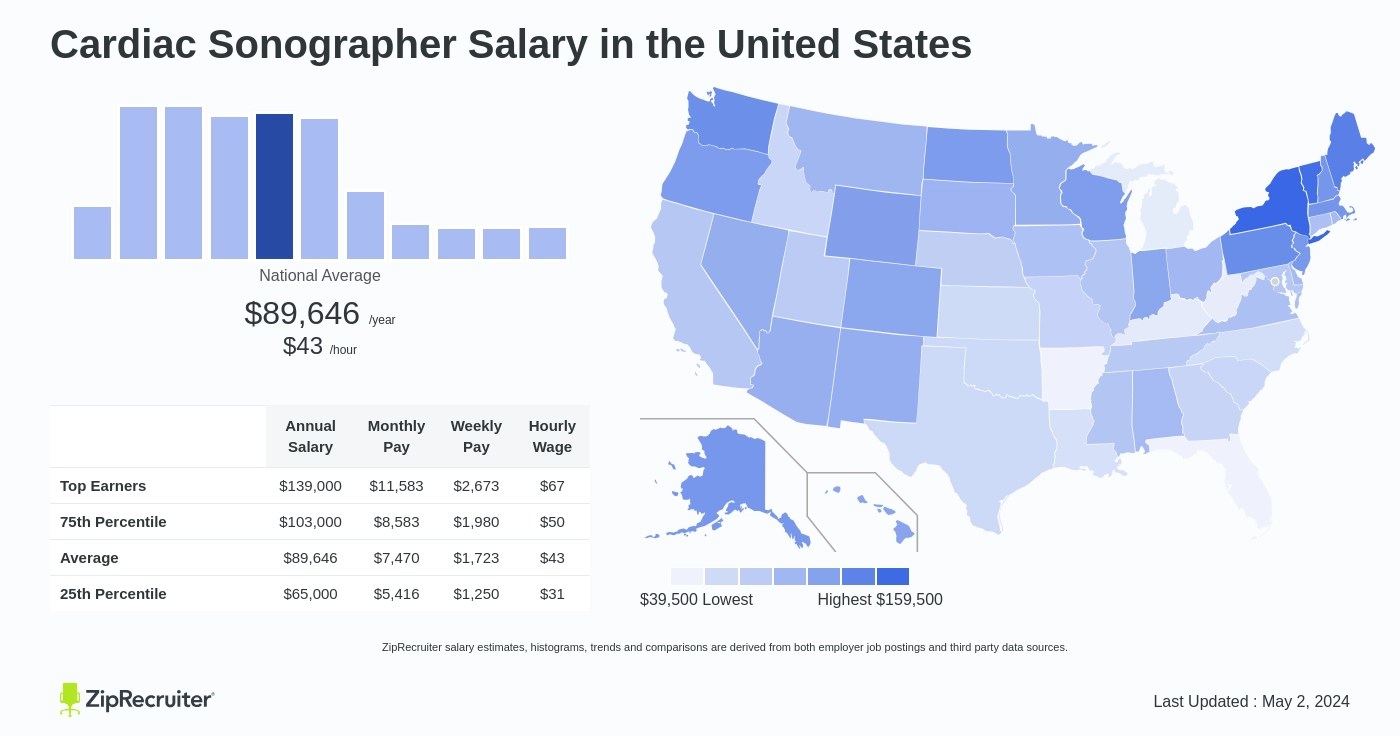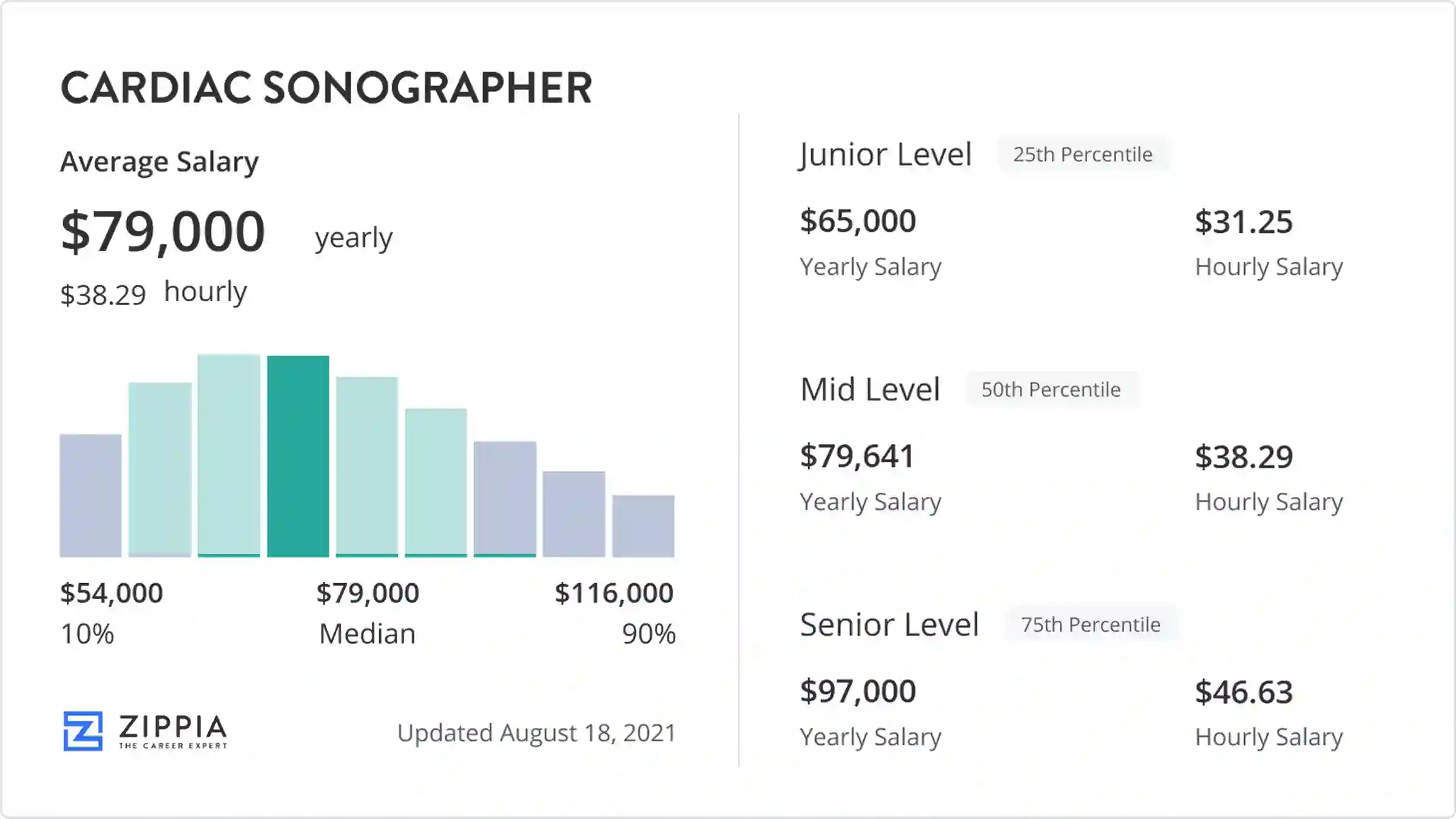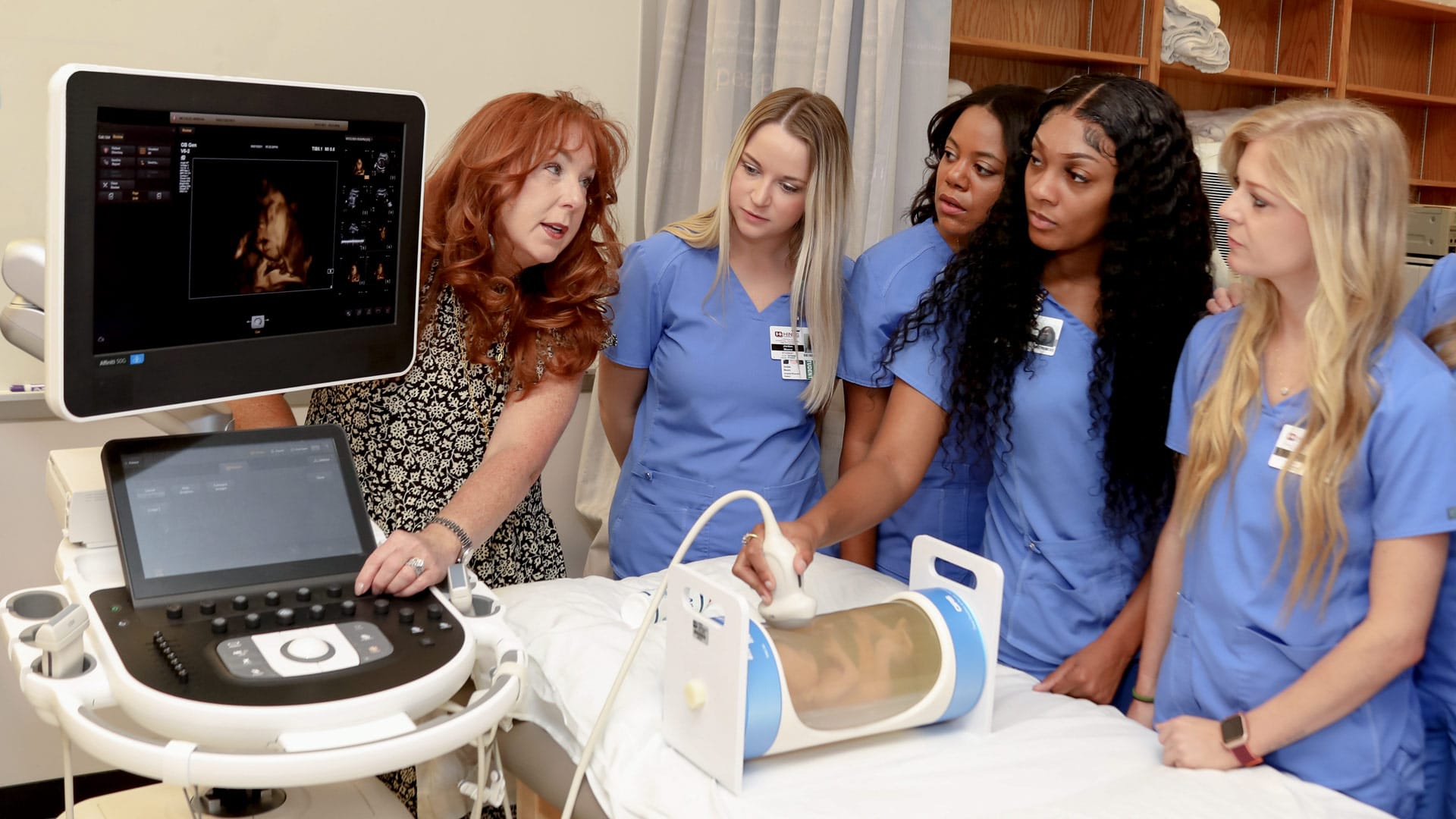Cardiac Sonographer Salary How Much Does A
Cardiac Sonographer Salary: An overview of the financial compensation received by professionals performing ultrasound examinations of the heart. A cardiac sonographer performs tasks such as capturing images of the heart, analyzing data, and providing diagnostic information to physicians. Their services are crucial in detecting and monitoring heart conditions, aiding in accurate diagnoses and appropriate treatment plans.
The role of a cardiac sonographer offers a blend of medical expertise and technical proficiency. They contribute to improved patient outcomes by facilitating timely and informed medical decisions. Advances in ultrasound technology have significantly enhanced the field, enabling more precise and comprehensive cardiac examinations.
This article delves into the financial aspects of a cardiac sonographer's career, exploring salary expectations, factors influencing compensation, and potential growth opportunities within the field.
Cardiac Sonographer Salary
Understanding the financial aspects of a career as a cardiac sonographer is crucial for informed decision-making. Several key aspects influence salary expectations, including experience, location, and certifications.
- Experience: Years of experience directly impact salary.
- Location: Geographic location plays a role in salary variations.
- Certifications: Additional certifications enhance earning potential.
- Education: Advanced degrees may qualify for higher salaries.
- Skills: Specialized skills, such as 3D echocardiography, are valued.
- Employer: Type of employer (hospital, clinic, etc.) can affect salary.
- Industry: Healthcare industry trends influence salary levels.
- Demand: High demand for cardiac sonographers contributes to higher salaries.
- Negotiation: Salary negotiations can impact earnings.
These key aspects provide a comprehensive understanding of the factors that determine a cardiac sonographer's salary. By considering these aspects, individuals can make informed career choices and optimize their earning potential.
Experience
Within the realm of cardiac sonographer salaries, experience stands as a pivotal determinant. Years of dedication to the craft translate into enhanced proficiency and expertise, which are duly reflected in compensation.
- Tenure and Proficiency: As cardiac sonographers accumulate years of experience, their skills and knowledge base expand, leading to increased efficiency and accuracy in performing ultrasound examinations.
- Expertise and Specialization: With experience comes the opportunity for specialization in advanced techniques like 3D echocardiography or stress echocardiography, further enhancing earning potential.
- Patient Management and Communication: Seasoned cardiac sonographers develop exceptional patient management and communication skills, fostering trust and rapport, which can positively impact job satisfaction and career growth.
- Industry Recognition and Reputation: Experienced cardiac sonographers often gain recognition within the healthcare community, leading to increased referrals and opportunities for higher-paying positions.
In summary, experience serves as a cornerstone of a cardiac sonographer's salary. It encompasses not only technical proficiency but also encompasses expertise, patient care, and professional reputation, all of which contribute to increased earning potential and career advancement.
Location
Geographic location emerges as a significant factor in shaping cardiac sonographer salaries. The cost of living, regional economic conditions, and healthcare market dynamics all contribute to variations in compensation across different geographical areas.
- Cost of Living: Cities with high living expenses typically offer higher salaries to compensate for the increased cost of housing, transportation, and other necessities.
- Regional Economic Conditions: The overall economic health of a region can influence salaries. Areas with strong economic growth and high demand for healthcare professionals tend to have higher salaries.
- Healthcare Market Competition: The level of competition among healthcare providers in a given area can impact salaries. In areas with a high concentration of hospitals and clinics, salaries may be lower due to increased competition for jobs.
- Unionization: The presence of strong unions in a region can contribute to higher salaries by negotiating favorable contracts for their members.
Understanding the geographic variations in cardiac sonographer salaries is crucial for informed career planning and salary negotiations. By considering location-specific factors, individuals can make strategic decisions to optimize their earning potential.
Certifications
Within the realm of cardiac sonography, certifications serve as a gateway to unlocking higher earning potential. By acquiring additional certifications, cardiac sonographers demonstrate their commitment to professional development, specialized knowledge, and adherence to industry standards. These credentials not only enhance their skills and expertise but also elevate their value within the healthcare job market.
Recognized certifications, such as those offered by the American Registry for Diagnostic Medical Sonography (ARDMS) and the National Board of Echocardiography (NBE), validate a cardiac sonographer's proficiency in specific areas of practice. These certifications attest to their competence in performing advanced procedures, interpreting complex images, and providing accurate diagnostic information.
In today's competitive healthcare landscape, employers actively seek cardiac sonographers with specialized certifications. These credentials serve as tangible evidence of a candidate's expertise and dedication to their craft. As a result, certified sonographers are often eligible for higher salaries, promotions, and leadership roles within their organizations.
Education
The pursuit of advanced degrees bears significant implications for cardiac sonographers seeking to elevate their earning potential. Higher education not only enriches their knowledge base but also demonstrates their dedication to professional growth and mastery of the field. This section explores the intricate connection between education and salary within the realm of cardiac sonography.
Advanced degrees, such as a Master of Science in Cardiovascular Sonography or a Doctorate in Sonography, equip cardiac sonographers with specialized expertise and advanced skills. They delve deeper into the complexities of cardiovascular anatomy, physiology, and pathology, enabling them to perform more comprehensive and intricate examinations. This enhanced proficiency translates into higher job responsibilities and leadership roles, which are often accompanied by commensurate compensation.
Real-life examples abound of cardiac sonographers who have reaped the benefits of advanced education. Those holding Master's degrees typically earn higher salaries than their Bachelor's-level counterparts, and doctoral-level sonographers command the highest salaries in the field. Their specialized knowledge and skills make them highly sought after by hospitals, clinics, and research institutions, leading to increased earning potential and career advancement opportunities.
Understanding the connection between education and salary empowers cardiac sonographers to make informed decisions about their professional development. By investing in advanced degrees, they can unlock higher earning potential, expand their career options, and make significant contributions to the field of cardiac sonography.
Skills
Within the realm of cardiac sonography, specialized skills, such as 3D echocardiography, hold immense value. These advanced techniques empower cardiac sonographers to capture intricate images of the heart, providing cardiologists with comprehensive data for accurate diagnoses and treatment planning. The mastery of such skills significantly enhances a cardiac sonographer's marketability and earning potential.
3D echocardiography, in particular, has revolutionized the field of cardiac imaging. It enables sonographers to generate three-dimensional anatomical models of the heart, allowing for detailed assessment of cardiac structures and function. This advanced technique is particularly valuable in diagnosing and monitoring complex heart conditions, such as congenital heart defects, valvular abnormalities, and cardiomyopathies.
Cardiac sonographers who possess specialized skills, such as 3D echocardiography, are highly sought after by healthcare institutions. Their expertise enables them to perform more comprehensive and accurate examinations, contributing to improved patient outcomes. As a result, they command higher salaries and have greater opportunities for career advancement.
Understanding the connection between specialized skills and earning potential empowers cardiac sonographers to make strategic decisions about their professional development. By investing in advanced training and certifications, they can acquire the skills that are in high demand within the healthcare industry, maximizing their earning power and career prospects.
Employer
Delving into the intricacies of cardiac sonographer salaries, it becomes evident that the type of employer can significantly influence earning potential. Various factors, ranging from organizational size and location to ownership structure and profit status, contribute to salary disparities across different employment settings.
- Hospital Size and Location: Larger hospitals, particularly those located in metropolitan areas with a high cost of living, tend to offer higher salaries to attract and retain qualified cardiac sonographers.
- Clinic Ownership: Cardiac sonographers employed by private clinics may earn more than those working in hospital-based clinics due to differences in overhead costs and profit margins.
- Non-Profit vs. For-Profit: Non-profit hospitals and clinics typically offer lower salaries compared to their for-profit counterparts, as their primary focus is on providing patient care rather than maximizing profits.
- Teaching Institutions: Cardiac sonographers working in teaching hospitals or clinics affiliated with universities may earn higher salaries due to their involvement in research and educational activities.
Recognizing the impact of employer type on salary empowers cardiac sonographers to make informed decisions about their career path. By carefully considering the factors outlined above, they can identify employment opportunities that align with their financial goals and career aspirations.
Industry
The dynamic nature of the healthcare industry exerts a profound influence on cardiac sonographer salaries. As the industry evolves, so too do the demands placed upon these healthcare professionals, shaping their earning potential in various ways.
- Technological Advancements: The advent of advanced imaging technologies, such as 3D echocardiography and strain imaging, has increased the scope of practice for cardiac sonographers. As they acquire specialized skills in these areas, their value to healthcare institutions grows, leading to higher salaries.
- Aging Population: The aging population has resulted in a growing demand for cardiac sonographers. As the prevalence of heart conditions rises, the need for accurate and timely diagnosis and monitoring increases, driving up the demand for skilled sonographers.
- Healthcare Policy: Government regulations and policies, such as the Affordable Care Act, have impacted healthcare industry trends. Changes in reimbursement and coverage have affected the financial landscape for healthcare providers, including cardiac sonographers.
- Economic Conditions: The overall economic climate can influence healthcare industry trends and, consequently, cardiac sonographer salaries. During periods of economic growth, healthcare spending tends to increase, leading to higher salaries for healthcare professionals.
Understanding the impact of healthcare industry trends on salary levels empowers cardiac sonographers to make informed career decisions. By staying abreast of industry developments and acquiring specialized skills, they can position themselves for success in the evolving healthcare landscape.
Demand
Within the intricate web of factors influencing cardiac sonographer salaries, demand stands as a pivotal force. The increasing need for skilled sonographers has created a favorable job market, driving salaries upward and presenting lucrative opportunities for those entering the field.
- Aging Population: The growing number of elderly individuals has led to a surge in heart-related conditions, escalating the demand for cardiac sonographers to diagnose and monitor these conditions.
- Technological Advancements: The advent of advanced imaging techniques, such as 3D echocardiography, has expanded the scope of practice for cardiac sonographers, increasing their value and marketability in the healthcare industry.
- Improved Patient Access: Initiatives aimed at enhancing healthcare access, such as the Affordable Care Act, have resulted in a greater number of patients seeking medical care, further fueling the demand for cardiac sonographers.
- Geographic Distribution: Regional variations in the supply and demand for cardiac sonographers can impact salaries. Areas with a shortage of qualified sonographers typically offer higher salaries to attract and retain talent.
The convergence of these factors has created a highly competitive job market for cardiac sonographers, leading to increased salaries and enhanced career prospects. Understanding the dynamics of demand empowers individuals to make informed decisions about their career path and leverage their skills to maximize their earning potential.
Negotiation
The art of salary negotiation plays a pivotal role in determining a cardiac sonographer's earning potential. Understanding the nuances of negotiation empowers individuals to advocate for their worth and secure competitive compensation packages.
Salary negotiations involve a delicate balance of research, preparation, and communication. Cardiac sonographers must meticulously research industry benchmarks, assess their skills and experience, and anticipate potential counteroffers. Effective communication involves presenting their value proposition clearly and confidently, while remaining open to compromise and collaboration.
Real-life examples abound of cardiac sonographers who have successfully negotiated higher salaries. A recent study by the Society of Diagnostic Medical Sonographers found that sonographers who engaged in salary negotiations earned an average of 10% more than those who did not negotiate. Another study by the American Society of Echocardiography revealed that sonographers with advanced certifications and specialized skills were able to command higher salaries through successful negotiations.
The practical applications of this understanding are far-reaching. Cardiac sonographers can leverage their knowledge of negotiation strategies to maximize their earning potential throughout their careers. By preparing thoroughly, communicating effectively, and understanding their worth, they can secure salaries that reflect their contributions to the healthcare field.
In summary, the exploration of "Cardiac Sonographer Salary: How Much Does A" reveals a multifaceted panorama of factors that shape earning potential within this specialized healthcare profession. Key considerations include experience, location, certifications, education, skills, employer type, industry trends, demand, and negotiation prowess. Understanding the interplay of these elements empowers cardiac sonographers to make informed decisions and optimize their financial outcomes.
As the healthcare landscape continues to evolve, it is imperative for cardiac sonographers to stay abreast of industry advancements and acquire specialized skills that enhance their value. By embracing ongoing professional development and honing their negotiation abilities, they can position themselves for success in this dynamic and rewarding field. The pursuit of higher education, such as a Master of Science in Cardiovascular Sonography or a Doctorate in Sonography, can further elevate earning potential and career prospects.
Mzansi Applauds: Sbahle Mpisane's Flaunting Confidence
Who Is Carly Lawrence? Wiki, Biography, Height, And More
Who's In The Running? Tulsa's Next Mayor Election



ncG1vNJzZmiokaOyr32NmqSsa16Ztqi105qjqJuVlru0vMCcnKxmk6S6cK%2FAq5uimZNiwLC6zqCpmqiYmr9uv8ClmKuxXZ28uHnMrpqhZZSksrR5wGefraWc